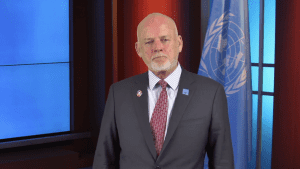 The Special Envoy for the Oceans of the United Nations Secretary-General, H.E. Mr. Peter Thomson, formally opened the SafeSeas Symposium on Capacity Building for Maritime Security on the 2nd of March. The goal of the high-level symposium is to rethink the strategy and methods of capacity building in the Western Indian Ocean region.
The Special Envoy for the Oceans of the United Nations Secretary-General, H.E. Mr. Peter Thomson, formally opened the SafeSeas Symposium on Capacity Building for Maritime Security on the 2nd of March. The goal of the high-level symposium is to rethink the strategy and methods of capacity building in the Western Indian Ocean region.
Jeddah Workshop on Djibouti Code of Conduct
SafeSeas director Prof Christian Bueger will attend and present at the High Level Workshop on the Implementation of the Jeddah Amendment to the Djibouti Code of Conduct, held in Jeddah, 7 to 9 of May. Prof. Bueger will give two presentations in order to feed the insights of SafeSeas into the process. In one talk … Read more
